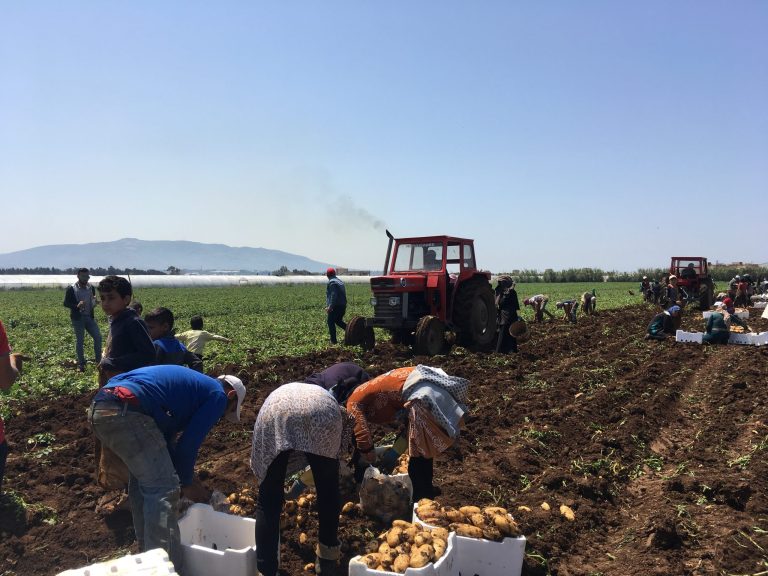From the United Kingdom to India, lockdowns aimed at containing Covid-19 are threatening nations’ abilities to secure food, as migrant workers are cut off from crops.
Lebanon, like many countries, closed its land borders after the novel coronavirus began to spread among its population. In normal times, that would have threatened the movement of seasonal farmhands from Syria.
But nine years into the civil war next door, Lebanon has no such problem. The Syrian farm workers were already there – as refugees.
In Lebanon’s northern region of Akkar, which borders the Syrian provinces of Homs and Tartous, the potato harvest is in full swing.
A group of Syrians hailing from the central province of Hama on one of the farms there works for 2,000 Lebanese pounds per hour, or 65 US cents at the going exchange rate. Most of them are families, who now live permanently in a makeshift camp on the farm. The camp is named for the Syrian foreman, whose father did the same task of recruiting before him.
“We used to go back and forth, but not anymore,” said Hudoud, a Syrian woman working on the farm. She says she has no more relatives in Hama.
There are few cases of Covid-19 in this region and none among the Syrians.
“We don’t have corona because we’re out in the fresh air and sun all day,” asserts Ziada, another Syrian woman working on the remote farm, where the global pandemic appears to be far from anyone’s consciousness.
The children there barely remember Syria after living in Lebanon for close to a decade. They are now accustomed to working in the fields in the morning and going to school sessions reserved for Syrians in the afternoon. Since the outbreak of the coronavirus, however, classes have been canceled and they help in the fields full time.
One 13-year-old girl, Nour, said she hopes to be a lawyer when she grows up.
Losses, losses everywhere
For the Lebanese trying to make a living from potato farming, the fact that their workers are available offers scarce consolation in the midst of an economic meltdown.
“The problem is not the farming, it’s the prices,” said Mohammed al-Masri, whose family owns the sprawling farm.

Lebanon is in its sixth month of financial crisis. The local currency, once interchangeable with dollars thanks to a two-decade peg, is in free fall. Thousands were losing their jobs even before the Covid-19 lockdown, leaving customers ill-prepared for rising inflation.
“However much you work, you are in the red,” Masri told Asia Times.
Last year, potatoes were generally sold for 600 piasters per kilogram – at the time 40 cents. This year, the farm raised its prices to 800 piasters to make up for the rising costs of fuel, but by mid-April that amount was worth only 25 cents.
During harvest season, the farm sends out about 20 tonnes per day, or 1,000 crates, each holding a kilo. That nets them 800,000 Lebanese pounds ($250), per day. The entire harvest usually nets between 60 and 80 tonnes, for a gross profit of between $750 and $1,000 at the current, rapidly-depreciating exchange rate.
While Lebanese farms can count on a stable supply of on-site labor, exports have been severely hampered by conflicts in Syria and Iraq, and now by the Covid-19 border closure.
“Before we’d send everything to the Gulf by land or sea,” Masri says. Now Lebanese farms are limited to the local market.
Sowing doubt
Masri concedes that his is the rare industry that can still function amid a now more than one-month lockdown. And local potatoes are a staple.
“You can’t stop it because people need to eat,” he said.
Potatoes are one of the more forgiving crops to work with, he added, since they can stay good for 20 days.
He points across his fields to a neighboring farm’s greenhouses: “His tomatoes and the courgettes go bad if they stay in the greenhouse too long. You have to pick them and then deliver them to the market right away.”
Lebanon during Asia Times’ visit to Akkar was enforcing a curfew from 7pm to 5am, during which time only ambulances, medical workers and other critical personnel are allowed on the roads. That has now been slightly loosened, but border crossings remain shut.
“After 7pm, no trucks can be on the road. This is when we used to send all our produce to Sidon,” Masri said, referring to the largest city in south Lebanon.
In normal times, wholesale markets in cities like Sidon would stay open all night, receiving deliveries from across the country – from tomatoes grown in the north to cherries cultivated in the Bekaa Valley.
“Now the souks are closed at 5pm, where they used to be open all night,” he said. The crops need to be picked all the same. “A lot gets thrown out,” he sighs.
The farm was lucky this year. The Masris had purchased $1,000 worth of seeds from Europe in early October, just before the dollar peg came completely unhinged and the central bank moved to restrict bank transfers.
“Next year,” he said, “no one knows what’s going to happen.”
(Asia Times)
















Comments About This Article
Please fill the fields below.